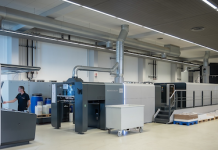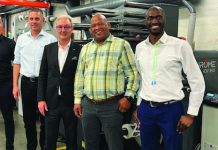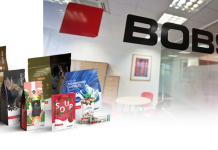Mike Horsten, GM Marketing (EMEA), Mimaki spoke at the Africa Print expo 2013 which was held at the Sandton Convention Centre from the 21st to the 23rd of August. His topic was based on Africa and the Future: Thinking Ecologically in Wide-Format.
Don’t think about expanding YOUR business, think about how your business, products and services can help your customer grow his.
The recipe is to focus 80% of time on existing business and 20% on looking for new business. Print is not a business that engenders loyalty and the mindset in South Africa is to buy on price so, to challenge that, it is necessary to offer something special. Help them grow their business and, as they grow, so will you.
Horsten stated that the key is to offer reliability and quality as well as price. Reliability means investing in good quality printing equipment that will deliver results consistently. A cheap machine that doesn’t perform is an expensive option, wastage (due to banding, stripping, etc) means printed material that cannot be sold – not to mention the cost of media, ink, machine wear and tear, operator expenses and (worst of all) the frustration.
Proof of reliable equipment can be determined by a trade show like Africa Print. Just check to see if there are any mechanics on the stand and be clear on whether you are going to be a full-service supplier or a niche supplier. The supplier will be volume-driven if they offer the full service. Customers (especially corporates) want “the whole trajectory”. Some may want more than A-Z manufacturing to service, they may even want the end result applied.
Big changes are coming. Driven by environmental and sustainability issues, and one major development is in soft signage (ie. Textiles). It’s an area of growth because it provides a cost-effective solution (signs can be folded and shipped in small boxes without any risk of damage); offering substantial savings in transportation costs and enhanced durability.
Other important developments are:
• Latex
• Water-based Solvent SUVs (introduced at FESPA)
Horsten gave the audience a chance to interact by asking posing the following question: Mimaki wants to know how to serve customers in Africa. What are local issues?
And the response from the Floor was:
Price is a major consideration for the African market. Although Chinese/Asian products are cheaper, and generally not of premium quality, the reality is that the East offers development funding which makes capital purchases affordable (when otherwise they are prohibitively expensive). The same generosity is generally not extended by Euopean and US companies, which makes it difficult to support them.
To which Horstens responded to by saying, This is not the only market that is driven by price. In this economic market it is the rule rather than the exception all over the world. One solution we are seeing is increased co-operation, sharing equipment to share costs) and splitting co-dependent functions (so, for example, X handles printing and Y handles cutting).





















